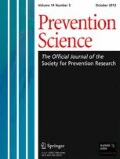Abstract
This study examined long-term follow-up data from a large-scale randomized trial to determine the extent to which participation in a school-based drug abuse prevention program during junior high school led to less risky driving among high school students. Self-report data collected from students in the 7th, 10th, and 12th grades were matched by name to students' department of motor vehicles (DMV) records at the end of high school. The DMV data included the total number of violations on students' driving records as well as the number of “points” that indicate the frequency and severity of the violations. A series of logistic regression analyses revealed that males were more likely to have violations and points on their driving records than females, and regular alcohol users were more likely to have violations and points than those who did not use alcohol regularly. Controlling for gender and alcohol use, students who received the drug prevention program during junior high school were less likely to have violations and points on their driving records relative to control group participants that did not receive the prevention program. Findings indicated that antidrinking attitudes mediated the effect of the intervention on driving violations, but not points. These results support the hypothesis that the behavioral effects of competence-enhancement prevention programs can extend to risk behaviors beyond the initial focus of intervention, such as risky driving.
Similar content being viewed by others
REFERENCES
Arnett, J. (1992). Reckless behavior in adolescence: A developmental perspective. Developmental Review, 12 ,339–373.
Baron, R. M., & Kenny, D. A. (1986). The moderator-mediator variable distinction in social psychological research: Conceptual, strategic and statistical considerations. Journal of Personality and Social Psychology, 51 ,1173–1182.
Baumrind, D. (1987). A developmental perspective on adolescent risk taking in contemporary America.NewDirections for Child Development, 37 ,93–125.
Botvin, G. J. (2000). Preventing drug abuse in schools: Social and competence enhancement approaches targeting individuallevel etiological factors. Addictive Behaviors, 25 ,887–897.
Botvin, G. J., Baker, E., Dusenbury, L. D., Botvin, E. M., & Diaz, T. (1995). Long-term follow-up results of a randomized drug abuse prevention trial in a White middle-class population. Journal of the American Medical Association, 273 ,1106–1112.
Botvin, G. J., Griffin, K. W., Diaz, T., & Ifill-Williams, M. (2001a). Drug abuse prevention among minority adolescents: One-year follow-up of a school-based preventive intervention. Prevention Science, 2 ,1–13.
Botvin, G. J., Griffin, K. W., Diaz, T., & Ifill-Williams, M. (2001b). Preventing binge drinking during early adolescence: One-and two-year follow-up of a school-based preventive intervention. Psychology of Addictive Behaviors, 15 ,360–365.
Botvin, G. J., Schinke, S. P., Epstein, J. A., & Diaz, T. (1994). Effectiveness of culturally-focused and generic skills training approaches to alcohol and drug abuse prevention among minority youths. Psychology of Addictive Behaviors, 8 ,116–127.
Donovan, J. E., Jessor, R., & Costa, E. M. (1988). Syndrome of problem behavior in adolescence: A replication. Journal of Consulting and Clinical Psychology, 56 ,762–765.
Harre, N. (2002). Risk evaluation, driving, and adolescents: A typology. Developmental Review, 20 ,206–226.
Insurance Institute for Highway Safety. (2002). Fatality facts: Teenagers. Accessed on November 12, 2003, from http://www.iihs.org/safety facts/fatality facts/teens.htm.
Jessor, R., (1987). Risky driving and adolescent problem behavior: An extension of problem behavior theory. Alcohol, Drugs and Driving, 3 ,1–11.
Jessor, R., & Jessor, S. L. (1977). Problem behavior and psychosocial development: A longitudinal study of youth. New York: Academic Press.
Norton, E. C., Bieler, G. S., Ennett, S. T., & Zarkin, G. A. (1996). Analysis of prevention program effectiveness with clustered data using generalized estimating equations. Journal of Consulting and Clinical Psychology, 64 ,919–926.
Tonkin, R. S., Cox, D. N., Blackman, A. R., & Sheps, S. (1990). Risk-taking behavior in adolescence. In R. J. McMahon, & R. D. Peters ( Eds.), Behavior disorders of adolescence: Research, intervention, and policy in clinical and school settings, (pp. 27–37). New York: Plenum.
Vernick, J. S., Li, G., Ogaitis, S., MacKenzie, E. J., Baker, S. P., & Gielen, A. C. (1999). Effects of high school driver education on motor vehicle crashes, violations, and licensure. American Journal of Preventive Medicine, 16(1S), 40–46.
Vingilis, E., & Adlaf, E. (1990). The structure of problem behaviour among Ontario high school students: A confirmatory-factor analysis. Health Education Research, 5 ,151–160.
Young, C. (1991). Alcohol, Drugs, Driving and You:Acomprehensive program to prevent adolescent drinking, drug use, and driving. Journal of Alcohol and Drug Education, 36 ,20–25.
Author information
Authors and Affiliations
Rights and permissions
About this article
Cite this article
Griffin, K.W., Botvin, G.J. & Nichols, T.R. Long-Term Follow-Up Effects of a School-Based Drug Abuse Prevention Program on Adolescent Risky Driving. Prev Sci 5, 207–212 (2004). https://doi.org/10.1023/B:PREV.0000037643.78420.74
Issue Date:
DOI: https://doi.org/10.1023/B:PREV.0000037643.78420.74



